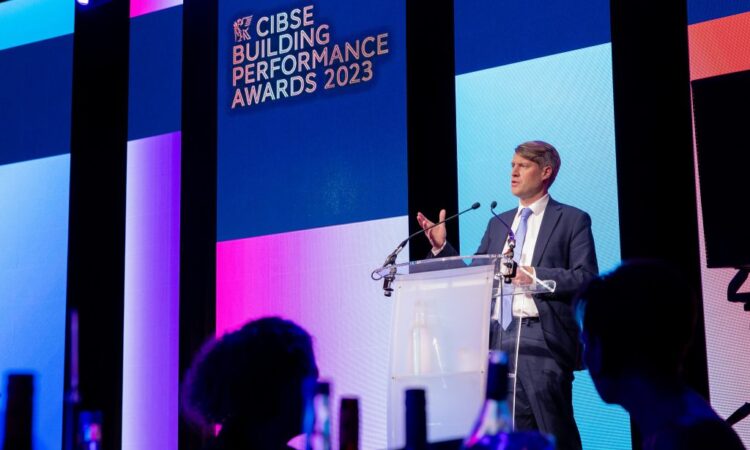
MP Chris Skidmore argues that much more must be done to enable engineers to ensure the UK can reap the economic and environmental benefits of decarbonised buildings and heat
UK authorities must ensure the effective decarbonisation of buildings and heat is treated as a vital environmental and economic priority. The claims have been made by the author of the recently published landmark net zero review that demanded more ambitious policy and assistance to aid engineers in cutting carbon emissions from both new and existing buildings.
Conservative MP Chris Skidmore said that both present and future UK Governments were at risk of failing to match and keep up with the efforts of neighbouring countries and other major economies in building low carbon industries that will be essential to mitigating climate change.
Mr Skidmore’s comments were made during the CIBSE Building Performance Awards held in London on March 1 that sought to honour innovation in a number of fields concerning building engineering and safety.
He noted that the UK had made a bold statement in 2019 when signing into law a commitment to ensure its industry, infrastructure, buildings and economy had net zero carbon emissions by 2050.
The country now needed to better detail and set out the policy and methods for how it would look to ensure how major contributors of carbon emissions such as heating and powering buildings will meet these targets, Mr Skidmore argued.
He said: “Three and a half years on, we are now in a position where the UK, having led on net zero, really risks falling behind.”
The ‘Mission Zero’ review, which was overseen by Mr Skidmore, heard evidence from specialists in a range of fields such as the HVAC and construction sectors about how best to meet the UK’s 2050 decarbonisation targets.
From the perspective of heating, the review set out a range of recommendations including backing the introduction of a ban on the sale and installation of natural gas boilers by 2033 in order to encourage a shift to low carbon alternatives. Other recommendations include revising the existing methodologies for measuring and rating the energy efficiency of buildings so that low carbon technologies are being incentivised.
Mr Skidmore told the audience at this week’s CIBSE Building Performance Awards that the findings of the report were intended to reflect the growing significance to national development in ensuring effective low carbon policies and incentives.
Economic oppurtunity
He said: “That was the core message of the mission zero report – that net zero is not just a policy that is there to tackle climate change and improve the environment, vital though that is. Net zero is now a principle economic opportunity for the 21st century.”
“There is a wall of international inward investment, ready and willing to be spent in the UK especially.”
The building industry was identified by Mr Skidmore as an important example of this strong potential for investment with companies such as Ameresco pledging to invest over £400m in district heating systems for the UK.
He said: “They know that the building standards that we have here and the work we are doing to develop net zero building standards and low carbon material standards in the future will mean a certain opportunity for investment for the future.”
Mr Skidmore said the net zero review also highlighted how much more there was needed to be done to ensure the effective development of low carbon buildings and systems to realise the opportunities for further encouraging further market development and investment.
The building sector had a significant role to play in several of the ten priorities identified in the net zero review. This was most notable in the focus on ensuring more energy efficient households.
Mr Skidmore added: “This is looking not just at how we can create net zero standards for new homes, but how we can create a retrofit revolution and how we can ensure in the future we deliver on the heat pump challenge.”
The government is expected this month to respond to the net zero review and its calls for more long-term clarity on heating plans as part of a wider overhaul of economic policy.
Outside of the government’s responsibility to decarbonisation, Mr Skidmore said it was important to depoliticise the net zero ambition to ensure cross-party consensus and consistency in the longer-term. It would also be critical to listen to specialists working across the building engineering sector.
He said: “We need to prioritise the role of the engineering profession even more than we have done so in Westminster. We most recognise that you hold the answers and hold the solutions and you are the future when it comes to delivering net zero.”
Building Performance Champion
The 2023 CIBSE Building Performance Awards honoured a range of organisations and individuals working to ensure more efficient and innovative HVAC solutions. Notable winners included Cardiff University’s Low Carbon Built Environment Team that was awarded the Building Performance Champion prize for a project focused on building a low carbon retrofit approach that could then be scaled up nationally in different property types.
This project looked at taking a whole-house design approach that combines technologies such as heat pumps, photovoltaics and battery technologies, along with fabric insulation, to reduce energy consumption, carbon emissions and cut bills.






